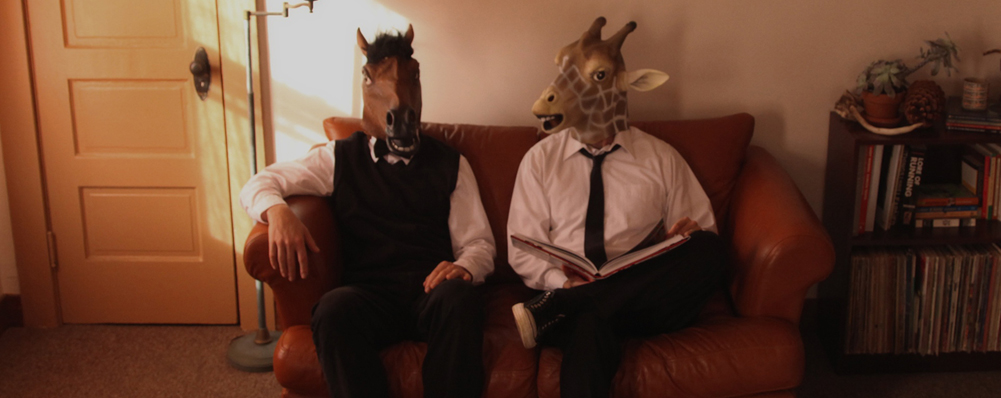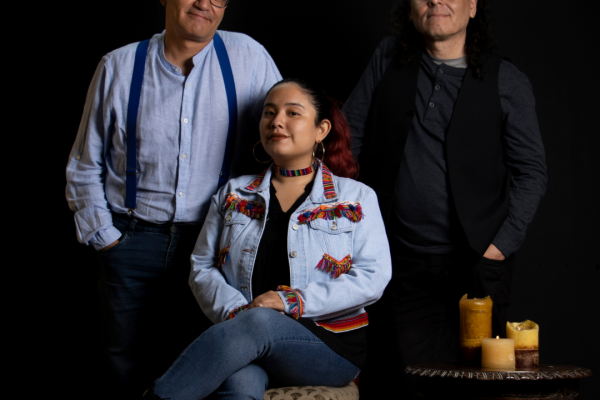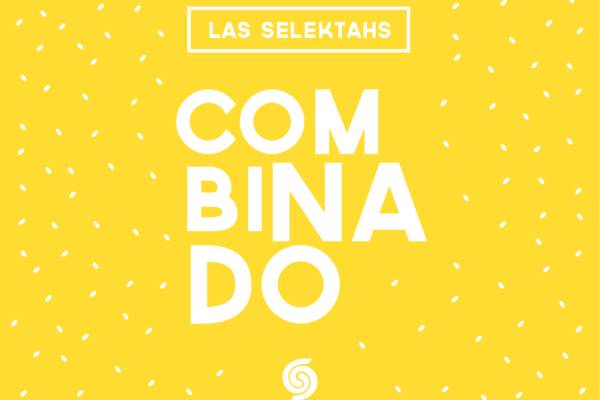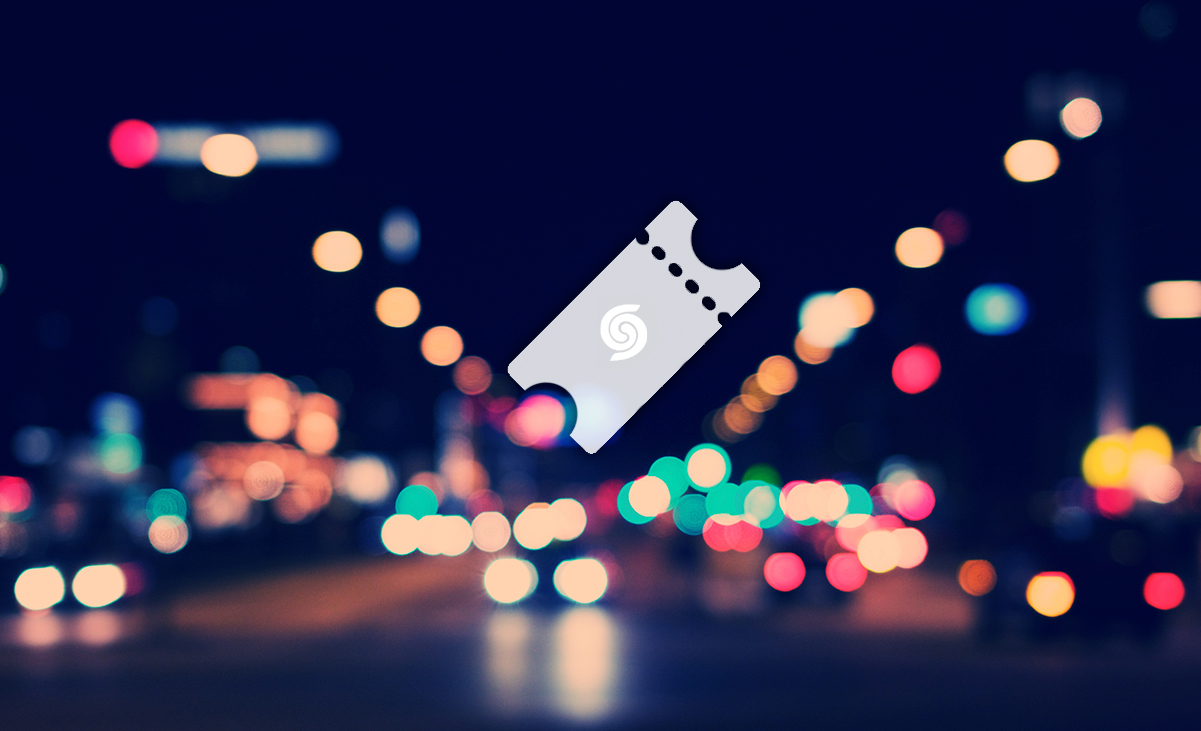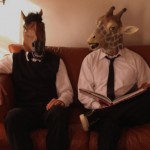 Con motivo del lanzamiento de su tercera producción, Sonidos conversó con una de las bandas globales que ha influenciado a bandas experimentales locales. ¿Math rock, post hardcore, punk progresivo? No importa! Ellos son «ellos mismos» y han incentivado a otras bandas locales (como Plug Plug y Pilotocopiloto, entre varios otros) a buscar, encontrar y jugar para forjar sus estilos musicales propios. Sonidos conversó con Joe Andreoli y Ken Topham, ellos son Giraffes? Giraffes!
Con motivo del lanzamiento de su tercera producción, Sonidos conversó con una de las bandas globales que ha influenciado a bandas experimentales locales. ¿Math rock, post hardcore, punk progresivo? No importa! Ellos son «ellos mismos» y han incentivado a otras bandas locales (como Plug Plug y Pilotocopiloto, entre varios otros) a buscar, encontrar y jugar para forjar sus estilos musicales propios. Sonidos conversó con Joe Andreoli y Ken Topham, ellos son Giraffes? Giraffes!
Español (Scroll down for English)
¿Cómo así deciden armar una banda de sólo guitarra y batería?
KEN: No creo que fuese una decisión definitiva en algún momento el no tener un bajista, simplemente fue que empezamos a tocar los dos juntos y era divertido. Rápidamente nos dimos cuenta que solo con los dos tocando, se producía una conversación o dialogo genuino. Hay una conexión directa entre Joe y yo. Puede ser como un juego a veces. Nos podemos decir bromas el uno al otro tocando algunas cosas. Tratamos de tazarnos y sacarnos. Es muy divertido. Al ser solo dos, también puede llegar a ser bastante intenso, podemos empujarnos el uno al otro al limite de nuestras habilidades físicas y mentales. Tratamos de mantenernos alerta el uno al otro.
JOE: Si, yo a veces fantaseo con expandir a la banda a un ensamble de 20… solo que no ha pasado aún. Es realmente divertido tener un ensamble de 2. Claro que hay limitaciones musicales por ahí, pero siempre tratamos de resolverlo lo mejor que podemos usando loops y diferentes tipos de instrumentación. No mucha gente se pregunta porqué se necesita tener una estructura de banda convencional, ¿Por qué no solamente dos?
¿Cuál es la formación musical de cada uno?
KEN: Mi formación musical fue así: Mi abuelo fue un baterista de jazz por décadas. Aprendí a tocar la batería y a aprender a leer ritmos cuando tenía 10 años en el programa de banda escolar. Compré mi primera batería cuando tenía 13 y empecé a tomar lecciones particulares y a tocar Nirvana con mis amigos (en los 90’s). Tomé clases particulares hasta que tuve 16 (ya para ese entonces ¡hacíamos covers de tool!). Tomé bastantes clases de música durante el tiempo que estuve en el colegio – banda de concierto, banda de jazz, teoría musical e historia de la música. Fui a la Universidad a estudiar música. Eventualmente saqué mi Bachillerato doble en Arte con especialización en Composición musical, historia de la música y literatura. Empecé a desarrollar un interés en ingeniería de grabación en adición a escribir y tocar cuando estaba en la Universidad.
Mi proceso de aprendizaje es así: Veo el show “jeopardy” todo el tiempo. Si quiero aprender algo, busco e investigo. Creo que cualquier cosa que uno quiera saber está disponible en el internet.
JOE: Yo crecí en un hogar musical. Mi mamá siempre ponía discos y aún cuando ella no toca ningún instrumento, me enseñó a apreciar genuinamente la música. Mi papa sabe tocar la guitarra en serio, lo ha hecho desde que era joven. Cuando estaba en primaria solía llevar a mi papá al “show and tell” del colegio y él tocaba la guitarra para todos ahí, se hacía el payaso para todos, él soltaba música en la casa. Mis padres me apoyaron bastante. Cuando era niño me dieron baquetas y yo ponía libros de diferentes tamaños sobre la cama y les daba duro hasta que se rompían. Luego me dieron una tarola y también le daba de alma. Cuando fui adolescente, empecé a juguetear con la guitarra de mi papá. Tomé una lección de guitarra donde el pata me enseñó lo que sea que es la primera escala básica que uno aprende. Nunca practiqué y me sentí mal y nunca más regresé a una clase en mi vida. Mi papa me enseñó algunos acordes y yo tocaba canciones terribles super fuerte. Hice eso por un tiempo y luego compré una batería completa. Empecé a tocar en algunas bandas al mismo tiempo, siempre de baterista, en una especie de banda de covers de rock and roll, una banda de blues-jam (aunque era menor de edad, me metía a los bares de blues y la hacíamos y nos emborrachábamos) y también en una banda de hardcore punk.
Mis papás se soplaban bastante ruido. Retrocedamos… finales de la adolescencia/a los veintitantos; continué tocando la batería, pero diferentes tipos de música como noisy post rock y experimental con improvisación y ese tipo de cosas. En ese momento empiezo a enfocarme un poco más en la guitarra de nuevo, pero esta vez me vino con una dirección distinta de la que tenía antes. Empecé a enfocarme solo en escribir canciones y crear música que yo pensara que era interesante. Nada de covers, olvídate de los acordes, olvídate de lo que se “supone” debes hacer con una canción. Empecé realmente a tratar de pensar en la música en mi cabeza Y LUEGO ver la forma de hacerla posible en la guitarra. Ahí fue realmente el inicio para mi.
¿Cómo componen?
KEN: Cuando hago música con Joe me fío bastante en los números y las matemáticas, especialmente algebra. Mis partes usualmente están compuestas en una forma de ecuación algebraica interpretativa.
JOE: Yo creo la mayoría de las guitarras en mi casa solo. Ensamblo las melodías, secciones e ideas generales en mi cabeza. Nunca escribo nada. Si es bueno lo recuerdo. Si lo olvido, tal vez regrese como un fantasma de la idea original, o tal vez no regrese jamás. Está bien. Siempre es bueno pensar en ideas nuevas. Entonces, voy a practicar con estos fragmentos en mi cabeza y se los muestro a Ken. Vemos que cosas funcionan juntas, que funciona de manera separada, que cosas son una porquería y no tocaremos jamás. Moldeamos estas cosas en canciones, escribimos secciones al paso juntos y luego vemos cuantas veces repetir partes y que otras cosas podemos hacer para mejorarlas.
¿Todas las estructuras de sus canciones son fijas o dejan algo de espacio para la improvisación?
KEN: Las estructuras son fijas. Pero siempre, como somos dos no más, estamos en la libertad de hacer lo que creamos encaje. Podemos cambiar lo que queramos dentro de la forma, o podemos alargar partes o acortar secciones. Simplemente nos miramos nos damos señales. Si yo muevo mi cabeza de una forma o Joe levanta las cejas de algún modo en particular, sabemos que hacer.
¿En qué se diferencia este nuevo disco a los dos discos anteriores?
KEN: La barba de Joe escribió la mayoría del disco Nuevo. Es todo barba.
JOE: si, el primer álbum fue como que sin barba. El Segundo fue barba pequeña y este ya es gran barba. En serio, creo que todo va progresando bonito. Estamos tocando mejor, las estructuras de las canciones están mejorando, y la producción del álbum en sí también ha mejorado- ¿que tal? ¡Cómo nos reventamos cohetes!
¿Cómo se dio el proceso de financiamiento del disco? Sabemos que fue mediante una nueva dinámica en la web. Cuéntenos un poco de esa experiencia.
KEN: Desde la época en que estábamos pobres, tuvimos que tragarnos nuestro orgullo y pedirles a amigos, familiares y otra gente que nos apoyaba por donaciones vía la web para financiar la duplicación del álbum que teníamos en proceso de grabación. Pusimos un pequeño video explicando nuestra intención. La respuesta fue abrumadora. El apoyo que mostró la gente de todo el mundo (¡incluido gente de Perú!) fue nada menos que increíble. Fue bastante alentador saber que había gente ahí que tenía la suficiente confianza e interés en nuestros esfuerzos artísticos y que estaban dispuestas a donar su bien ganado dinero para ayudarnos a hacer un álbum que eventualmente compartiríamos con ellos.
JOE: El apoyo mostrado fue una locura total. Queríamos lanzar este álbum por nuestra cuenta, pero no teníamos el dinero para hacerlo como se debe. Prensar 1000 cds no es tan caro, pero queríamos hacerlo en vinilo que si es bastante caro y era algo que ambos queríamos desde niños: ¡nuestra música en un disco de verdad! La gente nos apoyó de manera increíble, más de lo que imaginábamos y nos hizo sentir humildes. No voy a mentir, también fue aterrador. Una cosa que no habíamos pensado realmente cuando decidimos ser financiados por el público fue la presión que me iba a imponer después de darme cuenta que toda esta gente estaba dándonos dinero y apoyo para hacer un álbum del cual no habían escuchado ni una nota. ¡Que sería si la gente pensaba que el álbum era terrible! Pero, eventualmente entendí que la gente donaba porque creía en nosotros y torné todos esos sentimientos extraños en motivación para hacer el mejor álbum que pudiésemos hacer.
¿Cómo distribuyen su música actualmente?
KEN: además de vender nuestras cosas en las presentaciones, distribuimos por la web de una compañía llamada Hello Merch. Claro que siempre hay otras formas de obtener nuestra música….
JOE: ¿Como? Robando! En serio, una vez que el álbum salió en Bandcamp, vi como docenas de blogs de música ponían links a descargas gratuitas de nuestro disco. ¡Te estoy viendo! de cualquier manera, ASI ES. Te la puedes pasar jugando al gato y al ratón con estos sitios o decir jódanse y dejarlo ahí. Siempre ha sido más importante para nosotros que la gente escuche nuestra música mas que hacer dinero con nuestra música, pero recuerden: ¡El dinero nos ayuda a reparar el equipo para hacer mas música!
¿Sabían que son conocidos por circuitos underground en Perú? ¿Qué se necesitaría para que puedan venir?
KEN: La verdad no estaba tan al tanto del entusiasmo por la banda en Perú. Me hace muy feliz saber que la gente disfruta de la música que yo disfruté creando. Creo que la única cosa necesaria para ir a Perú sería un jet privado con un bar lleno, una mesa de masajes, una suite de lujo en el hotel mas fino (con Jacuzzi privado), todo el caviar que pueda comer, un mono aullador, café expreso sin límites, un oso perezoso de tres pies, una magnum .357 y un látigo
JOE: Eso es todo, reúnan esas cositas y ¡estamos ahí!
English
What made you form a band only with drums and guitar?
KEN: I don’t think there was any definite decision at any point to not have a bassist. The two of us just started playing together and it was fun. We quickly realized that with only two of us playing, a genuine conversation or dialogue is created. There is a direct connection happening between Joe and me. It can be like a game sometimes. We can tell each other jokes by playing certain things. We can try to psych each other out. It’s fun. It can also get pretty intense. Since there are only two of us we can really push each other to the extremes of our respective physical and mental ability. We try to keep each other on our toes.
JOE: Yeah, I daydream sometimes about expanding the band to a twenty-piece ensemble… but it just hasn’t happened yet. It’s incredibly fun having it just a two-piece. Of course, there’s musical limitations here and there, but we always to try work it out the best we can- by using loops and different sorts of instrumentation. Not enough people are asking themselves why it needs to be to conventional set-up… Why NOT a two-piece?
For each of you: What has been your musical background and learning process?
KEN: My musical background goes like this: My grandfather was a jazz drummer for decades. I started playing drums and learning to read rhythms when I was 10 years old through my school band program. I bought my first drum kit when I was 13 and started taking private lessons and playing Nirvana songs with my friends (this was the ‘90s). I took private drum set lessons until I was 16 (we were covering Tool songs now!). I took a lot of music classes in grade school- concert band, jazz band, music theory, and music history. I went to college to study music. I eventually earned a double Bachelor of Arts degree with specializations in Music Composition and Music History & Literature. I started developing an interest in recording/engineering in addition to writing and performing when I was in college.
My learning process goes like this: I watch the quiz show ‘Jeopardy’ all the time. If I want to learn something, I research it. I believe that anything you could ever want to know is available on the Internet.
JOE: I grew up in a musical household. My mom would always be playing records and even though she doesn’t play any instruments, she taught me to genuinely appreciate music. My dad plays guitar for real, he has since he was young. I used to bring in my dad for “show and tell” in elementary school and he’d play the guitar for everyone and be a funny goofball for everyone. He’d crank up music around the house too. My parents were really supportive. When I was a kid they gave me drumsticks and I would set up different sized books on my bed and whack the shit out of them until they were all broken. Then they got me a snare drum and I’d whack the shit out of that. When I was a teenager, I starting messing around with my dad’s guitar. I took one guitar lesson and the dude showed me whatever the basic first scale that someone learns is. I never practiced it and felt bad and never went to a lesson again. My dad taught me some chords and I played really terrible songs loudly. Did that for a while and then bought a full drum kit. I was playing in a few of bands at once, all on drums: a general sort of rock and roll cover band, a blues-jam band (though I was underage, I’d sneak into the blues clubs and we’d rip it up and get drunk), and a hardcore punk band. My parents put up with a lot of noise. Fast forward to late teens/early twenties. I continued playing drums, but different kinds of music like noisy post rock and experimental/improvisational type stuff. At that time I started to focus more on the guitar again, but came at it from a different direction than I had before. I started focusing only on songwriting and creating music that I thought was interesting. Forget covers, forget chords, forget what you’re “supposed” to do with a song. I really started to try to think of music in my head first AND THEN figure out how it was possible to make it on the guitar. That was really the beginning of it for me.
How do you usually create your compositions?
KEN: When I make music with Joe I rely heavily on numbers and mathematics, specifically algebra. My parts are usually composed in the form of an interpretive algebraic equation.
JOE: I create most of the guitar music at home by myself. Assemble melodies, sections of songs, and general ideas in my head. I never write anything down though. If it’s good then I’ll remember it. If I forget it, maybe it’ll come back- maybe it’ll come back as a sort of phantom of the original idea, or maybe it won’t come back at all. That’s OK. It’s always good to be thinking of new ideas. Anyhow, I go to practice with these fragments in my head and I show them to Ken. We figure out what works together, what works separately, and what is just shit and we don’t play it again. We mold these into songs, writing sections on the fly together and figuring out how many times to play what and other things we can do to generally enhance them.
Are all the structures of your songs strongly fixed or are they designed to allow improvisation?
KEN: The structures are pretty firmly set. But again, since there are only two of us, we are allowed the freedom to do as we see fit. We can change whatever we want within the form, or we can stretch parts out and/or slice sections short. We just look at each other for signals. If I shake my head one way or Joe raises his eyebrows another way, we know what to do.
What’s the difference between this new album and the ones before?
KEN: Joe’s beard wrote most of this new record. It’s all beard.
JOE: Yeah, the first album was like no-beard. The second was small-beard and this was big-beard. But seriously, I think that everything is progressing nicely. Our playing is getting better, the song structures are getting better, and the album production itself is getting better- how about that for tooting our own horn!
What was the process to finance this record? We know that it was through a website dynamic. Can you tell us a bit of this experience?
KEN: Since we were pretty much broke, we had to swallow our pride and appeal to our friends, families, and supporters for donations via a website to finance the duplication of the album we were already in the process of recording. We slapped together a short video explaining our intentions. The response was overwhelming. The support shown by people all over the world (including Perú!) was nothing short of incredible. It was encouraging to know that there were enough people out there who had enough trust and interest in our artistic endeavors that they would be willing to donate their hard-earned money to help us make an album we would eventually share with them.
JOE: The support was totally crazy. We wanted to release this new album ourselves, but didn’t have the money to do it right. Pressing 1000 CDs isn’t too expensive, but we wanted it on vinyl- which is really expensive and something we both have wanted since we were kids: our music on an actual record! People were incredibly supportive- way more than we imagined and it was really humbling. I’m not going to lie, it was also scary as fuck. One thing I hadn’t really thought about when we decided to crowd-fund this was the pressure that I would put on myself after realizing that all these people are giving money and support and have not heard one note of the new album. What if they think it’s fucking terrible? But, I eventually understood that these people donated because they believe in us and I turned those weird feelings into motivation to make it the best record that we could.
How do you distribute your music nowadays?
KEN: Aside from selling our stuff at shows, we distribute our music by means of the website of a company called Hello Merch. Of course there are always other means of obtaining our music…
JOE: Like stealing! Honestly, once the album came out on Bandcamp, I saw like a dozen music blogs linking to a free download of the album right away. I see you! But whatever, it seriously is THE WAY it is. You can spend your time playing Whack-A-Mole with these sites or say fuck it and leave it. It has always been more important to us that people listen to our music than for us to make money- but don’t forget that money really helps us replace broken equipment so we can make more music!
What would be necessary for you to come to Perú?
KEN: I was not aware of the enthusiasm for our band in Perú. It makes me happy to know that people are enjoying the music I enjoy creating. I guess the only thing necessary for us to visit Perú would be a private jet with a fully loaded wet bar and a massage table, a luxury suite at your finest hotel (with a private Jacuzzi), all the caviar I could eat, a howler monkey, an unlimited supply of espresso, a three-toed sloth, a .357 Magnum, and a whip.
JOE: That’s it. Assemble that small group of things and we’re there!
